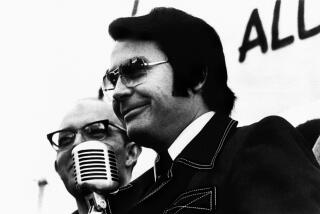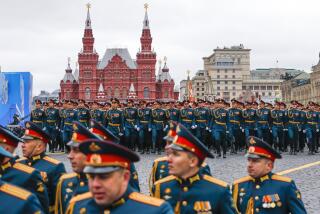Russia-Backed Mufti of Chechnya Quits After Years as Spiritual Head
- Share via
MOSCOW — It was shortly after midnight on June 26, 2003, when Akhmad Shamayev began to understand the price he would pay to act as the Moscow-backed Muslim spiritual leader of war-torn Chechnya.
Tiptoeing so quietly that no one heard them, several gunmen entered the home of a 72-year-old relative of the mufti and shot him to death in his bed.
The price became almost unbearable an hour later.
Shamayev’s 22-year-old son, Said-Ibragim, grabbed three friends and relatives, jumped into a car, and raced after the killers down the only road leading out of the village. Their bodies were found the next day.
“This was the way they wanted to get rid of me.... He was my cherished child,” Shamayev said. “He was tortured. His body was not even like a real body when they found it. His arms were broken. There were 48 bullet holes in various parts of the body, and a final shot to the head.”
But still Shamayev stayed on.
When the Moscow-backed Chechen president, Akhmad Kadyrov, was assassinated in a bomb attack in May 2004, Shamayev pledged loyalty to his successor, Alu Alkhanov. He stayed on when a bomb was found outside his home two months later.
Shamayev set up religious education programs to combat Islamic extremism, seen as a growing force among militant Chechen separatists. He advocated placing mosques under state control and imposing the death penalty on terrorists. He delivered the republic’s official sermon every Friday in Grozny, the capital, urging Muslims to put down their weapons and live in peace as citizens of Russia.
And then, late last month, Russian authorities announced that Shamayev, Chechnya’s mufti since 2000, was resigning. The official explanation was “health considerations.”
But the real reason was that Shamayev had finally had enough.
“I couldn’t do anything there -- no one took my words into consideration. I wanted to leave at a point where I could still save my face in front of my people. And I wanted to escape a nervous breakdown,” Shamayev said in an interview this week from his self-imposed exile in Moscow.
The 55-year-old cleric’s departure represents the latest blow to Russia’s attempt to paint Chechnya as a republic rapidly on the mend. President Vladimir V. Putin insists there is popular support for Alkhanov and for the Russian plan to hold the republic’s first postwar parliamentary elections later this year.
“I don’t see any problems,” he said during a visit to Germany last month.
Yet Russian and Chechen forces suffer casualties every week from roadside bombs, ambushes and firefights -- 85 Russian soldiers were killed in a recent two-month period. Even more disturbing is an apparent increase in the number of civilian “disappearances” in Chechnya over the last several months, with substantial numbers of citizens being seized at gunpoint and never returning.
There are widespread suspicions that security forces working for Ramzan Kadyrov, the republic’s first deputy prime minister and son of the slain president, are behind much of the current violence. The security force has been ordered to eradicate remaining insurgents in the mountains and villages.
“Every day and every minute, I have been hearing a kind of cry of my people,” Shamayev said. “I have seen the tears of mothers and the weeping of children. They have been crying these tears because so many people have disappeared: their children, their husbands -- all gone. And I could not bring any calm to their hearts ... and I just couldn’t bear it any longer.”
Shamayev has never seen himself as a Kremlin “collaborator.” Like his longtime ally Akhmad Kadyrov, who was the mufti before becoming president, Shamayev believed there was no future for an independent Chechnya. He saw coexistence with Russia as the only hope of averting more bloodshed and economic ruin. And he looked with increasing alarm at the evolution of the Chechen insurgency toward terrorism and religious extremism.
“I have always believed that if you cannot come to agreement, you read the Koran and see what the Koran says. And according to God, we must sit down and talk, and try to find mutual ground, and until you do, you will not be able to solve the problem,” Shamayev said.
“The main task we’ve had in these last few years is to prove to our people that these [extremist] trends are simply people who want to seize power by any means -- because Islam forbids the killing of civilian people, women and children,” he said. “[Akhmad] Kadyrov was fighting these religious trends with arms; I was fighting them with words.”
Shamayev, like many in Chechnya, arrived at his current life in a roundabout way. In an earlier life, he was a judo champion and spent 25 years teaching high school physics and chemistry. But after that, he became more and more drawn to the old Islamic texts, searching for ways to understand a world that was changing in increasingly unpredictable ways.
For years, Chechnya was part of the Soviet Union, a regime that frowned on religion and suppressed Muslims and Christians alike.
“There was a lot of pressure from the authorities in those days,” Shamayev said. “But when I compare that period with the current one, I can say it was the golden age. We fulfilled our duty for the sake of God, and we weren’t afraid of anything. We were the intelligentsia, but all the people were transferring knowledge to young people. We were brought up according to moral codes. I can say that the Chechen people were the most stable people.”
Then the Soviet Union disintegrated in 1991, and Chechnya declared its independence, sparking a war that lasted for more than a decade. Now, it is officially peacetime again. The only thing missing is the peace.
“I have shown my own incapability to influence the situation, and yet I hope my resignation would serve as an important catalyst for some people who still have official positions to ask themselves a question: ‘What can I do? How can I save these people?’ And if I cannot do that, I have to hand the position over to a better person,” Shamayev said.
Shamayev plans to remain in Moscow for now; it is “too dangerous for me to live in Chechnya” at the moment, he said.
The former mufti said he still supported Putin’s view of a Chechnya with broad autonomy, under the wing of the Russian Federation, secured mainly by Chechen forces. The problem, he said, was that the Russian president appeared unaware of how far the situation had spun out of control.
“All these illegitimate acts which are happening in Chechnya these days, the president is not correctly informed about what is happening,” he said, or “these problems would have been solved long ago.”
After all, he reasons, who could know what is happening in Chechnya and fail to act?
More to Read
Sign up for Essential California
The most important California stories and recommendations in your inbox every morning.
You may occasionally receive promotional content from the Los Angeles Times.










